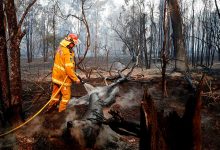Greenpeace Australia has unveiled the outcomes of an investigation into how News Corp outlets rushed to the defence of the fossil fuel industry during Australia’s summer of unprecedented bushfires, spreading misinformation about the role of climate change.
In a new 15-minute documentary entitled ‘Dirty Power: Burnt Country‘ Greenpeace Australia outlines how outlets like The Australian, the Daily Telegraph and Sky News Australia worked to mislead and confuse their audiences around the role climate change played in amplifying the destruction of bushfires, to cover up the role of the fossil fuel sector in contributing to global warming
“Even during a time of unprecedented coal-driven climate crisis, the fossil fuel industry still got its way by mobilising a dirty network of influence spanning Australian politics and media,” Greenpeace Australia’s head of research and investigations, Dr Nikola Casule says.
“The most extraordinary part of all this is, despite fossil fuels being the main driver of this climate-fuelled bushfire crisis, the industry itself walked away not only unscathed but with a scandalous amount of new projects approved.”
Greenpeace Australia found that during the bushfires, approval for more than 100 million tonnes of additional coal extraction was approved by governments, along with 352MW of gas generation capacity and 7,000 square kilometres of fossil fuel expansion areas.
Over several months, bushfires across most of Australia’s states and territories burnt through more than 12 million hectares of forest, killed more than one billion animals and destroyed thousands of homes.
While the bushfires caused destruction across much of Australia’s east coast, scientists and fire authorities were forced to respond to myths that the fires had been caused primarily by a lack of hazard reduction burning, rather than being amplified by the effects of global warming.
The myths were being pushed in a clear attempt to attribute blame for worsening bushfire conditions away from the fossil fuel sector and onto environmental groups.
The investigation found that News Corp papers led attacks on public figures who spoke out about the links between bushfires and climate change, including former NSW fire commissioner Greg Mullins and NSW energy minister Matt Kean.
News Corp papers were also found to be key to the spread of misinformation about the role of arson in causing the bushfires, misinformation that spread globally. Greenpeace found that News Corp reporting contributed to the global spread of the #ArsonEmergency hashtag on social media platforms.
Greenpeace Australia’s investigation found that News Corp outlets played a key role in the spreading of this misinformation, as well as working to downplay the seriousness of the bushfire season.
“It is well-established that climate change drives more severe fire seasons, and the biggest driver of climate change is the burning of coal,” Dr Casule said.
“The influence of the fossil fuel industry, through money and connections to the Federal Government and News Corp, has secured policies and actions that put the mining and burning of coal, gas, and oil above all else, even the safety of Australian families.”
Researchers from the Monash Climate Change Communication Research Hub found that News Corp owned newspapers accounted for 75 per cent of all news coverage that denied the link between bushfires and climate change.
“Had the sheer volume of disinformation published not occurred, the fossil fuel industry may not have gotten away with continuing to lobby and push for bushfire-driving projects to be approved,” Dr Casule added.
“It is clear that until the grip of the fossil fuel industry over Australia’s government and media is broken, federal action on climate change will remain elusive, putting Australians at greater risk of facing another Black Summer in years to come.”
On Wednesday, environmental groups warned of the level of influence the fossil fuel sector had over the Morrison government’s economic response to the Covid-19 crisis, through a handpicked National COVID-19 Coordination Commission.










